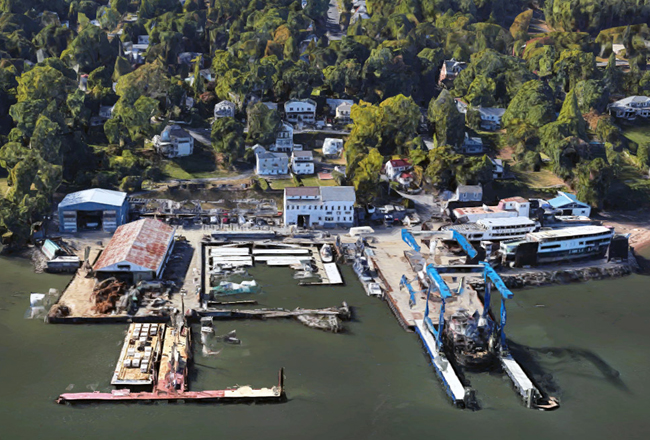North River Shipyard sues Upper Nyack for $8M over ‘retaliatory’ noise law
North River Shipyard is suing the village of Upper Nyack for $8 million over a noise law it says will cripple the business.
Graefe and Sons Corp. and Van Houten Holding Corp., owners of the business and property, accused the village of violating constitutional rights to due process and free speech. The complaint was filed last month in Rockland Supreme Court and moved on Aug. 6 to U.S. District Court, White Plains.
Mayor Karen Tarapata declined to comment on the charges, in an email message, but went on to say that she had never seen Ken Graefe, the owner, at the many public meetings held during the three years the village spent on developing the noise law.
“He and I did speak once outside village hall about the law before it was passed,” she said. “He shook my hand and said he could abide by its provisions. So I don’t get it.”
North River Shipyard is two miles north of the Gov. Mario M. Cuomo Bridge, and next to houses in the Van Houten’s Landing Historic District.

The shipyard was founded in the 1790s by John Van Houten. Sloops, schooners and steamboats were built there, according to the village’s 2020 Comprehensive Plan.
Under Julius Petersen, who ran the business in the 1900s, motor yachts were built for the wealthy. During World Wars I and II, Petersen’s Boatyard built boats for the military. Then for many years, the shipyard stored and repaired pleasure boats.
Graefe bought the business in 2010 and shifted the emphasis to repairing large commercial vessels, such as Circle Line cruise ships, and building docks. The village planning board approved Graefe’s plans, the lawsuit states, and found no “significant negative impact on adjacent uses or properties.”
In 2015, the village granted a special permit for fixing runways to accommodate a 400-ton mobile crane for hoisting boats. The planning board imposed a condition: sounds from the shipyard’s equipment should not exceed 80 decibels at the residential property line.
In 2018, when work began on assembling the crane, Roy Wanamaker, the village building and fire inspector, ordered the work to stop until a new site plan was submitted and a special permit issued, according to the complaint.
The shipyard, village and an environmental group contested the company’s rights in several legal actions, from 2018 through 2020.
Rather than continuing to litigate the dispute, the complaint states, the shipyard relocated the crane to a barge on the Hudson, “over which the village has no authority.”
On July 17, the village enacted a law that restricts use of heavy equipment to two hours, followed by at least a half-hour of no work, and limits weekday operations to 9 a.m. to 4:30 p.m., the lawsuit states, regardless of the level of noise produced by the equipment.
The shipyard had been operating 12 hours a day, so the law in effect restricts work to six hours and prevents “lawful use of the new crane.”
The intent of the law, according to a flyer published by the village, is to counteract “disturbing or excessive sound” that is a “detriment to the public health.”
The village’s 2020 Comprehensive Plan noted that the shipyard has become more industrial. It called for new standards for noise, lighting, odors, debris, air quality and impact on river views to maintain harmony with the homes in Van Houten’s Landing Historic District.
The complaint claims that the village’s actions are meant as retaliation against the shipyard for asserting its property rights in previous court actions.
The complaint states, without citing evidence, that the village’s actions were directed by Deputy Mayor Michael Esmay, who lives in the historic district.
New City attorney Donald S. Tracy represents the shipyard. White Plains attorneys Deanna L. Collins and Lewis R. Silverman represent the village.